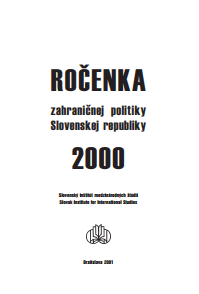Hlavné trendy vnútropolitického vývoja Slovenska v roku 2000 ako faktor zahraničnej politiky SR
The Main Trends of the Internal Political Development of Slovakia in 2000 as one of the Factors of the Foreign Policy of Slovakia
Author(s): Grigorij Mesežnikov
Subject(s): Politics, Government/Political systems, International relations/trade, Evaluation research
Published by: Research Center of the Slovak Foreign Policy Association (RC SFPA)
Keywords: Slovakia; 2000; foreign policy; Internal Political Development; main trends; government; political parties; evaluation;
Summary/Abstract: Beside the geographical location, economic and defence potential, position in the system of international relations and the quality of diplomatic service of a country, the character of its internal political development also belongs to those factors, which influence the foreign policy of a country. The relationship of a country with another ones, its co-operation with neighbouring countries, its participation in international organizations and groupings of countries depend on the type of its political regime, way of functioning of its institutions, level of political stability and the quality of its legislation and actual configuration of political forces. The importance of the interrelation of the internal and foreign policy of a country was proved during the short history of Slovakia in the nineties. The memberships in European and Trans Atlantic economic and defence groupings, including the OECD, were declared a priority in the field of foreign policy by all the Slovak governments until now. However, the progress of Slovakia in the integrational process has significantly slowed down mainly because of internal political reasons during 1994 - 1998. As a result of democratic deficits and sharp internal political confrontation, which led to institutional instability, Slovakia was not accepted into the NATO in the first round of its enlargement, and it does not get also into the first group of associate members with which the EU started discussion about membership issues. The negotiations with the OECD about the membership in this grouping of the economic most developed countries of the world finished without any positive result for the former government.
Book: Ročenka zahraničnej politiky Slovenskej republiky 2000
- Page Range: 49-56
- Page Count: 8
- Publication Year: 2001
- Language: Slovak
- Content File-PDF

